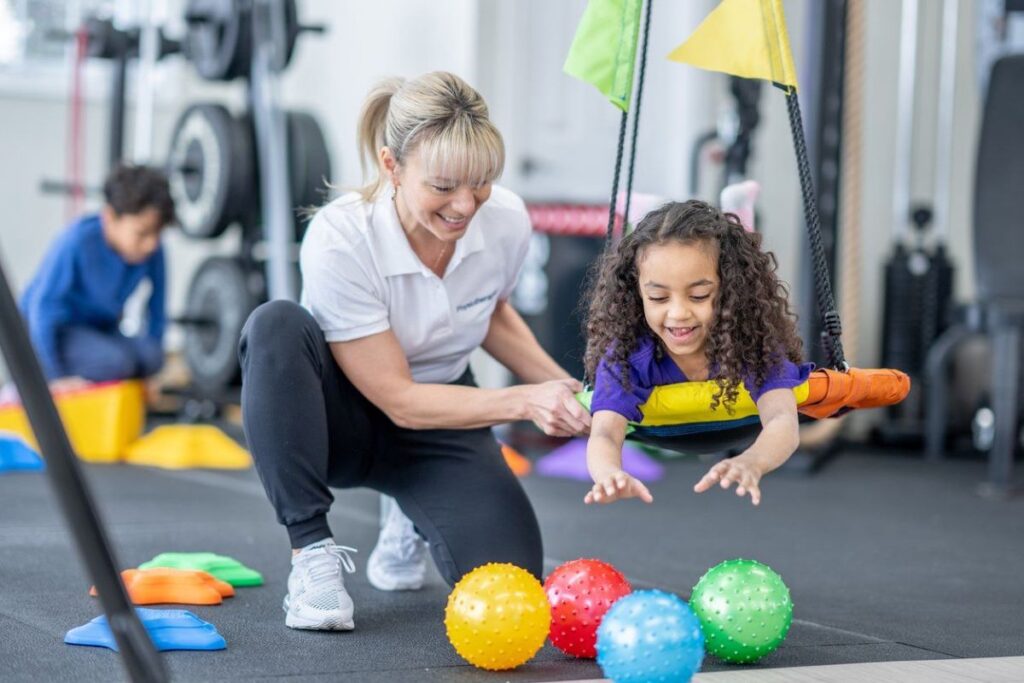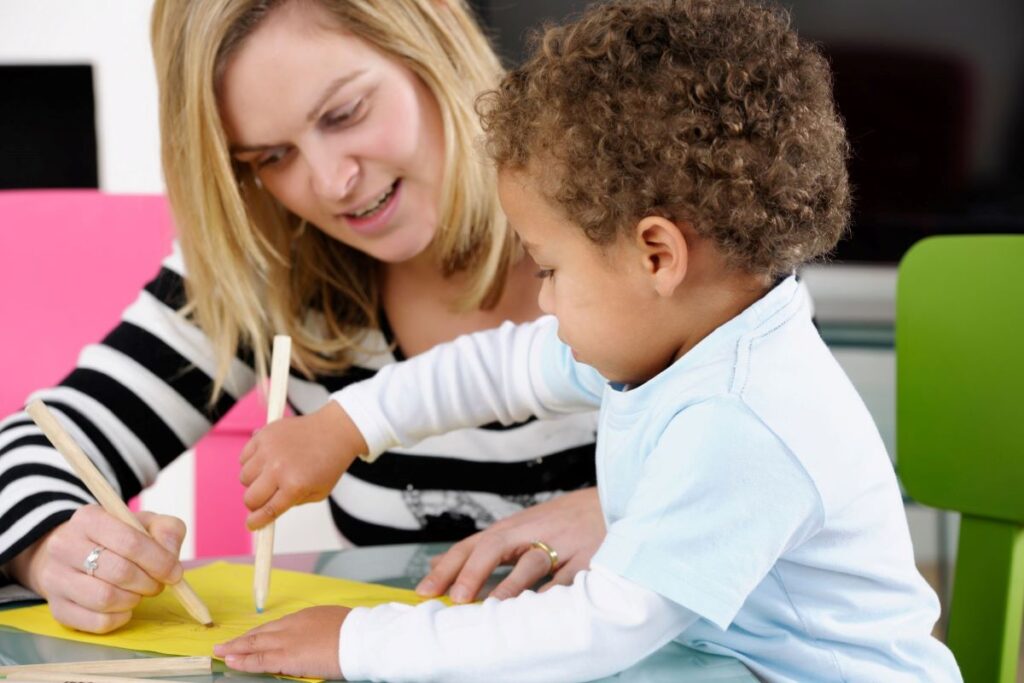Speech therapy is a crucial intervention for children with autism, playing an important role in their development. This specialised therapy focuses on the specific communication difficulties these children experience, helping them develop essential skills for expressing themselves and interacting socially.
Children with autism often have trouble with:
- Verbal communication
- Understanding non-verbal cues
- Engaging in social interactions
- Developing language skills
- Speaking clearly
Speech therapy provides a structured setting where these challenges can be tackled through personalised interventions. The benefits go beyond just improving speech – they impact every area of a child’s life, including their academic performance and social relationships.
Research shows that early intervention through speech therapy can greatly improve a child’s communication skills and social confidence. This therapeutic approach equips children with autism with the tools they need to effectively convey their thoughts, feelings, and needs, laying the groundwork for meaningful connections with their family, friends, and wider community.
Understanding Speech Therapy for Kids with Autism
Children with Autism Spectrum Disorder (ASD) experience unique communication challenges that can impact their daily interactions and development. These challenges often manifest in different ways:
- Delayed Speech Development: Many children with ASD struggle with verbal expression and may not meet typical language milestones
- Difficulty Understanding Social Cues: Non-verbal communication, facial expressions, and body language can be challenging to interpret
- Limited Vocabulary: Some children might have restricted word usage or struggle with expanding their language repertoire
- Sensory Processing Issues: Speech development can be affected by sensory sensitivities common in ASD
Speech therapists play a vital role in creating individualised treatment plans based on comprehensive assessments of each child’s unique needs. These specialists evaluate:
- Speech patterns and pronunciation
- Language comprehension
- Social communication skills
- Non-verbal communication abilities
The therapy techniques employed are diverse and tailored to each child’s specific requirements:
- Visual Support Systems: Picture cards and visual schedules to aid communication
- Alternative Communication Methods: Sign language or augmentative devices when needed
- Play-Based Learning: Interactive activities that make therapy engaging and effective
- Social Stories: Narrative techniques to help understand social situations
- Sensory Integration: Activities that consider sensory sensitivities while developing speech skills
Speech therapists work closely with families to implement these techniques in natural settings, ensuring skills transfer effectively to daily life. Regular assessments track progress and allow for adjustments to therapy approaches as needed.
Benefits of Speech Therapy for Kids with Autism
Speech therapy creates significant positive changes in children with autism through targeted interventions and consistent practice. The benefits extend across multiple areas of communication and social development:
1. Enhanced Expressive Language Skills
Speech therapy helps children with autism develop their expressive language skills, including:
- Development of clear speech patterns and vocabulary
- Ability to form complete sentences to express thoughts
- Learning to use appropriate tone and volume
- Mastering non-verbal communication methods when needed

2. Improved Social Communication
Through kids speech therapy, children can improve their social communication skills, such as:
- Recognition of facial expressions and body language
- Understanding of social cues and conversational turn-taking
- Development of age-appropriate conversation skills
- Increased confidence in social situations
3. Reduction in Repetitive Speech Patterns
Speech therapy helps children move beyond echolalia (repeating phrases or sentences) by focusing on:
- Learning to generate original responses
- Understanding the context of conversations
- Developing spontaneous communication
- Building a functional vocabulary for daily needs
These therapeutic interventions create lasting impact on a child’s ability to navigate social situations and express themselves effectively. The skills gained through speech therapy sessions transfer into real-world settings, enabling children to participate more fully in family life, educational settings, and community activities.
Research shows that early intervention with speech therapy leads to better outcomes in language development and social communication. Children who receive consistent therapy show marked improvements in their ability to initiate conversations, express emotions, and engage meaningfully with peers and family members.
Support Systems in Speech Therapy for Kids with Autism
Family involvement creates a powerful foundation for successful speech therapy outcomes in children with autism. Parents and caregivers serve as essential partners in the therapeutic process, extending practice beyond clinical sessions into daily life.
Key Ways Families Support Speech Therapy:
- Implementing therapy strategies during routine activities
- Creating communication-rich environments at home
- Maintaining consistency with therapeutic approaches
- Documenting progress and challenges
- Participating in parent training sessions
Research demonstrates that children make significant progress when families actively engage in their speech therapy journey. A study published in the Journal of Autism and Developmental Disorders found that children whose families practiced speech therapy techniques at home showed 40% faster improvement in communication skills.
The home environment provides natural opportunities for skill reinforcement:
- Mealtimes for requesting foods and expressing preferences
- Playtime for turn-taking and social communication
- Bedtime routines for following multi-step instructions
- Daily activities for building vocabulary and sentence structure
At Stronger Together Foundation, families receive specialised training and ongoing support to effectively implement speech therapy strategies. This collaborative approach ensures children receive consistent support across all environments, maximising their potential for communication development.
Parents and caregivers who actively participate in therapy sessions gain valuable insights into their child’s communication patterns and learn effective techniques for supporting language development at home. This knowledge empowers families to become confident communication partners in their child’s journey. You may like to visit https://firststoppainrelief.com/what-to-expect-from-castle-hill-speech-and-ot-services-for-kids/ to get what to expect from Castle Hill speech and OT services for kids.
Community-Based Support and Collaboration in Speech Therapy for Kids with Autism
Community-based speech therapy creates natural learning environments where children with autism can practice communication skills in real-life settings. These authentic experiences help children generalise their skills across different situations and environments.
A collaborative approach between therapists, families, and peers creates a strong support network that enhances speech therapy outcomes. This network includes:
- School Integration: Speech therapists working directly with teachers to implement communication strategies in the classroom
- Peer Support Groups: Structured activities with neurotypical peers to practice social communication
- Community Activities: Guided interactions at parks, libraries, and local events to build practical communication skills
Research shows that children who receive speech therapy in community settings demonstrate improved:
- Social engagement with peers
- Functional communication in daily activities
- Confidence in various social situations
- Ability to adapt communication styles to different environments
The involvement of multiple support systems creates opportunities for:
- Regular practice of communication skills
- Natural social interactions
- Development of age-appropriate language
- Building meaningful relationships
Speech therapy in community settings allows children to learn and practice communication skills where they naturally occur, making the learning process more relevant and effective. This approach helps create lasting positive changes in communication abilities and social interactions.

Conclusion
Speech therapy is a life-changing intervention for children with autism, opening doors to better communication and social connections. Its benefits go beyond just speech development:
- Building Confidence: Children gain self-confidence through improved communication skills, allowing them to express their thoughts and needs effectively.
- Social Skills Growth: Better communication leads to meaningful interactions with peers and stronger relationships.
- Life-Changing Impact: The skills learned in speech therapy have lasting positive effects on education, family dynamics, and daily activities.
Research shows that early intervention through speech therapy helps children with autism reach their full potential. With the support of professionals, families, and consistent practice, these children can develop crucial communication skills for life.
Speech therapy is essential in helping children with autism thrive in their communities, build lasting relationships, and achieve their individual goals. The journey may have its challenges, but witnessing a child gain confidence and independence through improved communication makes every effort worthwhile.

